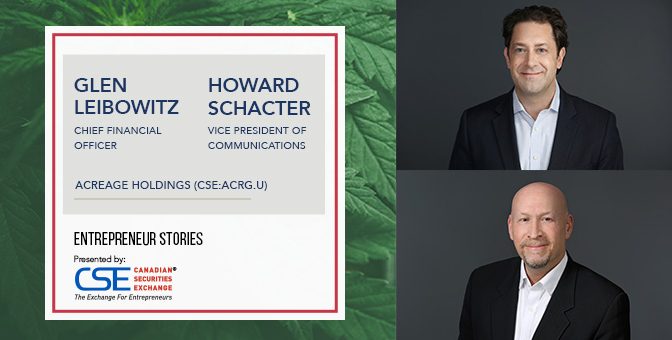Brayden Sutton is a refreshing change of pace in the cannabis industry.
Sharp. Concise. Thoughtful. And yet, blunt – not in any way that is impolite, but in a way that very simply underscores his bunker of experience in the cannabis industry.
As the founder and Chairman of the Board of 1933 Industries (CSE:TGIF), Sutton is helping steer a small but mighty ship that is looking south – to the Silver State, primarily.
“Nevada is the place to be,” says Sutton. “It’s one of the most attractive cannabis markets in the US, which provides a solid backdrop for growth.”
Nevada is more than a stone’s throw from 1933’s headquarters in Chilliwack, British Columbia, but it is, undoubtedly, a state like no other. The company also has partnerships in California and Colorado, but it is Nevada where 1933 has been at the heart of growth in the cannabis business for years.
Dawn of a new era
As for the name? The “1933” in the company’s moniker is a nod to the year when the prohibition of alcohol ended in the US.
“It was the dawn of a new era,” says Sutton. Today, 1933 Industries aims to capitalize on opportunities that have come as a result of the end of cannabis prohibition in Canada and industry legalization in a collection of US states.
“The US has not even begun yet,” says Sutton. “I compare it to what Canada was like in 2012 so there’s an incredible opportunity there. It has years of accelerated growth ahead.”
“There’s no roadmap right now,” adds Sutton. “The risks are higher in the US than in Canada, but it brings much higher upside potential.”
A diversified mix of assets
1933 Industries certainly seems to have the asset portfolio to make the most of that potential. Licensed medical and adult-use cannabis cultivation and production assets; proprietary hemp-based, CBD-infused products; CBD extraction services and a specialized cannabis advisory firm.
The company has three subsidiaries: Alternative Medicine Association LC (AMA) and Infused MFG – both located in Nevada – and Spire Global Strategy, located in Vancouver.
AMA is a licensed medical and adult-use cannabis cultivation and production facility in Las Vegas that hosts its own line of products, while also manufacturing other companies’ brands. Some of these products include concentrates such as Cake Batter, Crumble and Sugar; a vape pen sold with distillate oil; and several flower strains.
“AMA holds the first cultivation license for cannabis in Las Vegas,” says Sutton. “It has over 100 products in 46 states across 700 retail stores.”
And that’s a number that’s poised to grow, thanks to 1933’s brand new 67,750 square foot cultivation facility in Las Vegas, which represents a 10-fold increase from what it previously held.
Nevada, the place to be
If Nevada is the state to be in, Las Vegas is the city. With more than 42 million visitors each year, it is poised to become one of the world’s largest adult-use cannabis markets.
The new facility is a key piece of the puzzle, as it will ensure consistent supply of cannabis flower and input material, meaning increased capacity, production efficiencies and economies of scale, all of which the company believes will improve yields and provide higher margins.
The facility is segmented into five different zones, with 15 bloom rooms and four veg rooms. Once at full capacity, it’s anticipated it will produce 700-800 pounds of flower monthly.
But that’s not the only piece of the puzzle for 1933 Industries. Subsidiary Infused MFG is a Las Vegas-based manufacturer of hemp- and cannabidiol-based products with a number of proprietary product lines, which include the well-known Canna Hemp, Canna HempX, Canna Hemp Paws and Canna Fused. The consumer packaged goods division experienced over 8,000% growth during its first year and represents the fastest growing segment of the company’s business. Nationally recognized, the Canna Hemp brand resonates with customers seeking the benefits of CBD and hemp and are available in over 700 retail outlets across the US.
Building a hempire
Adjacent to its cultivation facility, 1933 Industries is progressing with plans to launch one of Nevada’s largest hemp extraction facilities, as it focuses its gaze on the booming cannabinoid, or CBD, industry.
The new processing facility will produce extracts for full spectrum oils, distillates and isolates. The lab will also have the flexibility to isolate cannabinoids that are emerging in popularity. 1933 Industries aims to have it up and fully running by the end of the year.
The company has invested heavily in research and development, particularly where it comes to the design of its customized equipment, in order to provide maximum capacity and efficiency.
“We want to utilize the isolates in the manufacturing of our own consumer branded goods and secure the supply of raw materials,” says Sutton, adding that the move will increase margins and benefit from a recurring revenue stream from sales to other manufacturers.
Another subsidiary is Spire Global Strategy, an advisory firm that provides diligence, security, and intelligence services to clients around the world and is headquartered in Vancouver. It gives the company exposure to Canada and addresses the lack of discussion around infiltration of organized crime, diversion of product, internal theft of product, products making it into stores when they should not be, and other issues.
A string of, let’s face it, cool deals
There is a certain coolness factor when it comes to 1933 Industries – from its Instagram page to some of the partnership deals it’s signed to the look and feel of its products.
1933 subsidiary Infused MFG partnered with legendary skateboarder Tony Hawk in April under a two-year licensing agreement with House of Hawk for the launch of several exclusive, co-branded hemp & CBD products. It’s part of a growing trend, aimed to bring awareness of the rise of CBD in the sports world.
The company also inked a two-year agreement with OG DNA Genetics to cultivate, manufacture, distribute and sell OG’s branded cannabis. In the cannabis world, think of OG DNA Genetics as the crème de la crème of the cannabis genetics world. Rooted in Los Angeles and founded in Amsterdam, over the last decade the company has built and curated a seasoned genetic library, with operating procedures for genetic selection, breeding, and cultivation.
Subsidiary AMA also recently inked a licensing deal with hip-hop artist and actor Kurupt to bring his Gotti’s Gold cannabis brand to the Nevada market, the second partnership of its kind. For those unfamiliar, Kurupt is a hip-hop legend and actor who played an instrumental role in the launch of the early careers of some of the most notable names in the genre: 2Pac, Warren G, Dr. Dre and Snoop Dogg.
Bright future
But at the end of the day, on paper, numbers matter, and Sutton is the first to underscore that.
In an industry that can be quick to assign eyebrow-raising valuations to companies that have no earnings, no revenue and sometimes little more than a logo and an investment deck, 1933 Industries appears to be a lean machine poised for an exciting year and beyond as it moves towards profitability.
The next step?
“Block out the noise, build value and continue what we’re doing,” says Sutton. “We have an incredible head start.”
1933 Industries is using a tried and true model for a simple reason: it works. That model is to establish a foothold in several parts of the value chain and replicate it in other jurisdictions. The firm’s strength lies in its diversity of assets, which are focused on some of the most attractive niches of the cannabis industry.
“Many have the strategy to get into as many states as they can,” says Sutton. “But some states are superior to others. We’re not interested in a ‘let’s own the world’ strategy. We’re interested in a ‘best-on-balance’ strategy. At this point, Nevada is the place to be, so we’re going to go big there.”
This story was originally published at www.proactiveinvestors.com on June 17, 2019 and featured in the Public Entrepreneur magazine.
Learn more about 1933 Industries at https://www.1933industries.com/.










